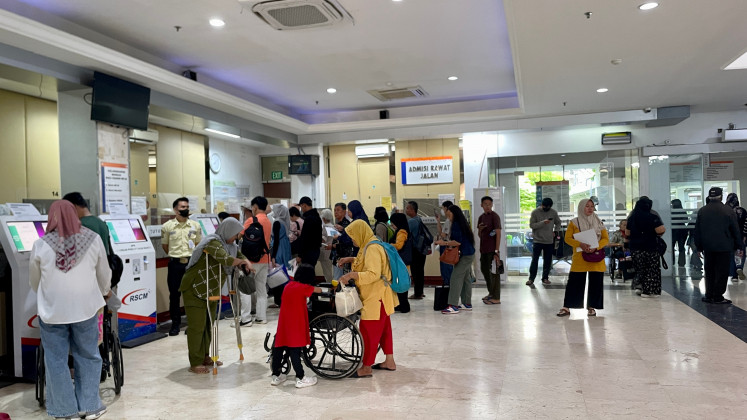Popular Reads
Top Results
Can't find what you're looking for?
View all search resultsPopular Reads
Top Results
Can't find what you're looking for?
View all search resultsRedDoorz optimistic about future in Indonesia despite Jakarta PSBB
RedDoorz CEO Amit Saberwal said that occupancy rates in Indonesia had risen to 30 to 40 percent during the relaxation of large-scale social restrictions (PSBB), which began in May.
Change text size
Gift Premium Articles
to Anyone
B
udget hotel booking and management platform RedDoorz has said it is optimistic about its future in Indonesia, with the company expecting occupancy rates to increase despite the reimplementation of partial lockdown measures in the capital.
RedDoorz CEO Amit Saberwal said that occupancy rates in Indonesia had risen to 30 to 40 percent during the relaxation of large-scale social restrictions (PSBB), which began in May.
Although occupancy was “not optimal” compared to pre-COVID-19 levels of 60 to 70 percent, he said the rate had been slowly creeping up.
“The slow uptick was there, and it will continue,” he told The Jakarta Post in an interview on Monday. “However, I foresee that there will be a demand dip again in Jakarta for sure.”
Saberwal also said he was optimistic the budget hotel industry would be among the first sectors to economically recover after the pandemic, fueled by demand from domestic tourists.
He said the mid-segment market and high-end travel market were expected to pick up once international flights returned to normal.
Such a trajectory, he added, had been seen in the domestic tourism and hospitality industries of China and South Korea.
“I think Indonesia and other countries with high domestic travel demand have seen slight recoveries,” he said, adding that he predicted more of a recovery to be seen in the first quarter of next year as most governments would have flattened the COVID-19 infection curve by that time.
In May, the company reported that it would work on a zero-revenue assumption until next year. While Saberwal said the strategy was no longer in place, he said RedDoorz would remain conservative and aim to improve efficiency.
“In the last three to five months we have been focusing more on being an efficient company. I didn't want to expand our footprint to the point that we could not help our existing partners,” he said, referring to RedDoorz’ 1,500 hotel partners across the country.
He also said the company had been focusing on automation, including in its refund system, to make the process more seamless and reduce human error.
Recently, RedDoorz competitor OYO found itself in the spotlight when its customers flocked to social media to express their frustrations about the difficulties they had faced receiving refunds. Meanwhile, another budget hotel aggregator Airy closed down after failing to cope with the impacts of the pandemic.
In a separate development, the rise in popularity of online shopping, particularly online grocery shopping, driven by the COVID-19 pandemic and the enforcement PSBB is predicted to be the driving force of growth in the e-commerce sector in Indonesia and Southeast Asia this year, experts have said.
Indonesia E-commerce Association (IdEA) chairman Bima Laga said the use of e-commerce platforms to shop would increase again as Jakarta entered another phase of PSBB on Monday.
“I believe the demand for groceries and food items will still be high,” he said during a webinar hosted by MarkPlus on Friday.
“So, this is an opportunity for sellers to tap into the growing sector.”
Jakarta Governor Anies Baswedan announced at a press conference on Sunday that the capital would return to full-scale PSBB on Monday, albeit with several relaxations, after months of “transitional PSBB”, amid a continued rise in COVID-19 cases. The measures will remain in place for two weeks and could be extended.
During the PSBB period, schools, tourist sites, recreational areas and public parks, among other areas, will be closed. Meanwhile, traditional markets and malls will be allowed to operate at 50 percent visitor capacity, but restaurants and cafes will only be allowed to provide takeaway and delivery orders, Anies said.
E-groceries platform HappyFresh marketing vice president David Liem said the reinforcement of PSBB measures would lead to a surge in the demand on the platform.
The platform saw spike in demand in the second quarter this year, he added.
“Every time the government announces a new regulation on PSBB measures, we see an uptick in demand, but then it goes down. This is because people are adapting to the new normal and they are not as panicked as before,” he said during the webinar.
David said that HappyFresh saw its first big spike in demand at the onset of the COVID-19 outbreak in April. The company has since adapted to cater to the growing need, such as by hiring more personal shoppers and increasing its stocks.
“More and more people are relying on e-grocery platforms, but the more important thing is how to make it a permanent habit once the pandemic is over,” he added.
A survey by management consulting company Redseer in August found that more than half of Indonesian respondents said their spending on e-grocery platforms had increased during the pandemic, while up to 60 percent said they would continue to buy groceries online in the future.










